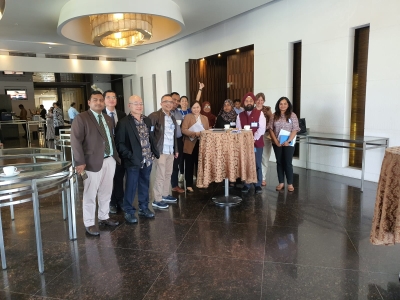IPB University Lecturer Formulates The Asian Regional Climate and Health

The World Health Organization (WHO) for the Southeast Asia Region is holding discussions with environmental experts and stakeholders for the first time post-pandemic. This important discussion discusses climate change adaptation policies on health.
Perdinan, PhD, Lecturer at IPB University from the Department of Geophysics and Meteorology, Faculty of Mathematics and Natural Sciences also attended the discussion representing IPB University and Indonesia. He became the leader of the World Health Organization South East Asia Regional (WHO-SEAR) Expert Group discussion on Environmental Determinants of Health and Climate Change which took place for four days from 13 to 16 March 2023 in New Delhi, India. He develops appropriate adaptation and mitigation policies together with WHO officials from each country.
He discussed topics related to the connection between economic and environmental dynamics. According to him, economic dynamics in terms of meeting human needs for land and energy have an impact on climate change and the incident of disease spread. Of course, this has implications for economic sectors so mitigation and adaptation policies are needed.
He explained that several work areas discussed on the first day were related to food systems, air pollution, sustainable energy, climate change and disease, communication and media, as well as the voice of the younger generation. It formulates appropriate policies and action plans according to each country's interests and suitability.
“The role of the government is involved to overcome the complexity of the relationship between factors. After mapping, basic formulation and target indicators are carried out to measure the success of action plans in each country, including those related to air pollution," he explained.
The second day, this SEAMEO BIOTROP researcher also noted several important points related to population growth and economic activity on human health. Important points discussed were pollution source management, air quality monitoring and forecasting, capacities and tools to measure health impacts, access to affordable technologies with low emissions, and addressing gaps in remote areas also to vulnerable groups in their implementation.
He added, that strategic plans were also designed to strengthen the health sector and predict risks. Starting from education in the workplace, improving security systems, increasing ecosystem services, to using affordable technology in achieving air quality targets.
On the third day, this Economic Expert in the Assessment of Climate Information discussed air pollution advocacy activities and interventions in various sectors whose policies and actions impacted health. This includes monitoring and implementing action plans on air pollution and health in the context of the 2030 Agenda for Sustainable Development.
“The roadmap was prepared using a multi-sectoral approach as a reference for the state in intra- and inter-sectoral interventions coordinated at the national and sub-national levels. Also, involving and prioritizing political and technical strategic collaboration. The link between air pollution and health impacts is structured on a science basis to increase public awareness and appropriate policy action. (MW/Zul) (IAAS/MFR)


